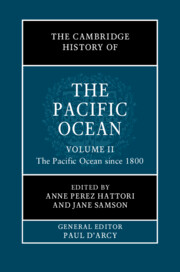Book contents
- The Cambridge History of the Pacific Ocean
- The Cambridge History of the Pacific Ocean
- The Cambridge History of the Pacific Ocean
- Copyright page
- Contents
- Figures
- Tables
- Contributors to Volume II
- Frontispiece
- General Editor’s Introduction
- Preface to Volume II
- Part VII Rethinking the Pacific
- Part VIII Approaches, Sources, and Subaltern Histories of the Modern Pacific
- Part IX Culture Contact and the Impact of Pre-colonial European Influences
- Part X The Colonial Era in the Pacific
- Part XI The Pacific Century?
- 54 The USA and the Pacific since 1800
- 55 World War II and the Pacific
- 56 The Nuclear Pacific
- 57 Shrinking the Pacific since 1945
- 58 China and the Pacific since 1949
- 59 Pacific Island Nations since Independence
- Part XII Pacific Futures
- References to Volume II
- Index
59 - Pacific Island Nations since Independence
from Part XI - The Pacific Century?
Published online by Cambridge University Press: 11 November 2022
- The Cambridge History of the Pacific Ocean
- The Cambridge History of the Pacific Ocean
- The Cambridge History of the Pacific Ocean
- Copyright page
- Contents
- Figures
- Tables
- Contributors to Volume II
- Frontispiece
- General Editor’s Introduction
- Preface to Volume II
- Part VII Rethinking the Pacific
- Part VIII Approaches, Sources, and Subaltern Histories of the Modern Pacific
- Part IX Culture Contact and the Impact of Pre-colonial European Influences
- Part X The Colonial Era in the Pacific
- Part XI The Pacific Century?
- 54 The USA and the Pacific since 1800
- 55 World War II and the Pacific
- 56 The Nuclear Pacific
- 57 Shrinking the Pacific since 1945
- 58 China and the Pacific since 1949
- 59 Pacific Island Nations since Independence
- Part XII Pacific Futures
- References to Volume II
- Index
Summary
In the wake of World War II European colonial powers, considerably weakened by six years of devastating warfare, found it increasingly difficult to impose their will on populations inspired at least partly by their own (i.e. European) doctrines of nationalism, self-determination, and popular sovereignty. The experience of the World War II had also given rise to a widespread conviction, at least among Western nations, that democratic institutions and practices were vastly superior to those of the defeated fascists and, by implication, to virtually all other forms of authoritarianism. And if democracy was good for the nations of Europe, it must be equally good for those emerging from colonialism.
- Type
- Chapter
- Information
- The Cambridge History of the Pacific Ocean , pp. 683 - 704Publisher: Cambridge University PressPrint publication year: 2023

